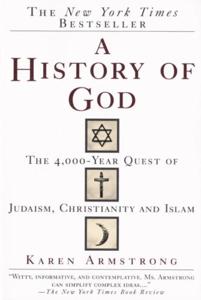
Want to learn the ideas in A History of God better than ever? Read the world’s #1 book summary of A History of God by Karen Armstrong here.
Read a brief 1-Page Summary or watch video summaries curated by our expert team. Note: this book guide is not affiliated with or endorsed by the publisher or author, and we always encourage you to purchase and read the full book.
Video Summaries of A History of God
We’ve scoured the Internet for the very best videos on A History of God, from high-quality videos summaries to interviews or commentary by Karen Armstrong.
1-Page Summary of A History of God
Overview
Regardless of your religious beliefs, you can’t deny that the three main monotheistic religions have shaped history. Humans have always believed in a divine presence influencing worldly affairs, but there’s something very distinctive about the way God has been conceived by Judaism, Christianity and Islam.
These three Abrahamic religions have had a huge impact on the modern world. They’ve influenced each other and changed over time, but there are still common ideas among them. For example, they all believe in one God. Each religion has been affected by Greek philosophy, periods spent in exile and Enlightenment ideas. The idea of God continues to change today as well.
In this passage, the author discusses how different cultures view God. He also explores how a culture’s views on itself are reflected in its view of God. The author also explains that there were many people who preserved Greek wisdom for Christianity and tells us about some ancient beliefs about humans being created by gods.
Big Idea #1: A distinctive concept of God emerged among the Israelites in the Levant.
How do you see God? He is seen by many as the creator of the world, and others as a spiritual presence. There are different ways to conceptualize God that have existed for millennia, and it’s important to trace them back in order to understand how they developed. The journey begins 14,000 years ago in the Middle East with pagan tribes who saw society as fragile thing; they worshipped gods that countered forces of disorder and quelled chaos.
The Babylonian creation myth tells the story of how the first gods emerged from a primeval wasteland. The god Marduk then created humankind by mixing his blood with dust, which meant humans were thought of as semi-divine in nature. One group stood out for their ideas about the divine: the Israelites. They had settled in Canaan and claimed descent from Abraham and his grandson Jacob, who was also known as Israel.
The Israelites originally worshipped multiple gods, but they started worshipping a single God. This was similar to the pagan belief in a High God or Sky God.
The ancient Israelites had two gods, Yahweh and Elohim. The former was their supreme god while the latter was a local deity of Egypt. When they returned from Egypt after being enslaved, they swore to worship only Yahweh. As a result, it’s said that Yahweh promised to protect them from harm for doing so.
Big Idea #2: The Israelites developed a distinctive understanding of God, whose nature continued to change over time.
Yahweh was initially conceptualized as the god of war, but he evolved into a more universal concept. He had prophets like Isaiah to whom he spoke directly and revealed himself in personal ways that were different from other gods.
While other gods were similar to humans, Yahweh was different. He was more of a god and less human-like. Humans were created from his blood, unlike pagan gods, who had no such connection with humans.
There was a reason why Yahweh was special. He demanded loyalty and the rejection of other gods. The pagans always had room for other gods, but not so with Yahweh. Idolatry became a sin because of him.
The god Yahweh changed over time, starting with the prophet Isaiah. In his time, he was seen as a creator god and man’s creation was his greatest achievement.
In the fourth century BCE, people started to think of Yahweh as a wise god.
There were also tensions between Judaism and Greek philosophy. After all, leading Greek philosophers thought of God as a removed, abstract entity, while Jews saw Yahweh as constantly involving himself in worldly affairs.





